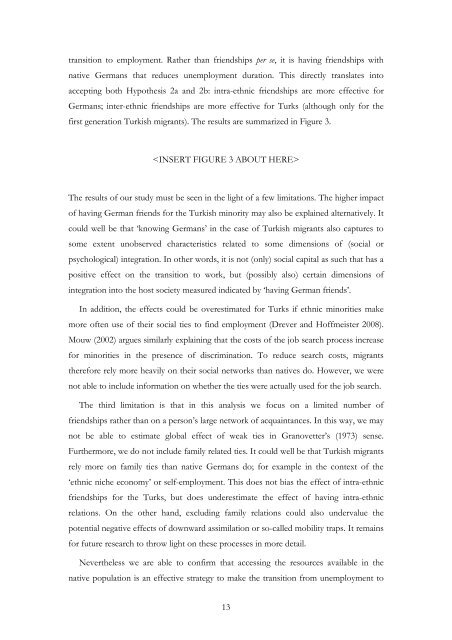Turkish migrants and native Germans compared - IMISCOE Cross ...
Turkish migrants and native Germans compared - IMISCOE Cross ...
Turkish migrants and native Germans compared - IMISCOE Cross ...
Create successful ePaper yourself
Turn your PDF publications into a flip-book with our unique Google optimized e-Paper software.
transition to employment. Rather than friendships per se, it is having friendships with<strong>native</strong> <strong>Germans</strong> that reduces unemployment duration. This directly translates intoaccepting both Hypothesis 2a <strong>and</strong> 2b: intra-ethnic friendships are more effective for<strong>Germans</strong>; inter-ethnic friendships are more effective for Turks (although only for thefirst generation <strong>Turkish</strong> <strong>migrants</strong>). The results are summarized in Figure 3.The results of our study must be seen in the light of a few limitations. The higher impactof having German friends for the <strong>Turkish</strong> minority may also be explained alter<strong>native</strong>ly. Itcould well be that ‘knowing <strong>Germans</strong>’ in the case of <strong>Turkish</strong> <strong>migrants</strong> also captures tosome extent unobserved characteristics related to some dimensions of (social orpsychological) integration. In other words, it is not (only) social capital as such that has apositive effect on the transition to work, but (possibly also) certain dimensions ofintegration into the host society measured indicated by ‘having German friends’.In addition, the effects could be overestimated for Turks if ethnic minorities makemore often use of their social ties to find employment (Drever <strong>and</strong> Hoffmeister 2008).Mouw (2002) argues similarly explaining that the costs of the job search process increasefor minorities in the presence of discrimination. To reduce search costs, <strong>migrants</strong>therefore rely more heavily on their social networks than <strong>native</strong>s do. However, we werenot able to include information on whether the ties were actually used for the job search.The third limitation is that in this analysis we focus on a limited number offriendships rather than on a person’s large network of acquaintances. In this way, we maynot be able to estimate global effect of weak ties in Granovetter’s (1973) sense.Furthermore, we do not include family related ties. It could well be that <strong>Turkish</strong> <strong>migrants</strong>rely more on family ties than <strong>native</strong> <strong>Germans</strong> do; for example in the context of the‘ethnic niche economy’ or self-employment. This does not bias the effect of intra-ethnicfriendships for the Turks, but does underestimate the effect of having intra-ethnicrelations. On the other h<strong>and</strong>, excluding family relations could also undervalue thepotential negative effects of downward assimilation or so-called mobility traps. It remainsfor future research to throw light on these processes in more detail.Nevertheless we are able to confirm that accessing the resources available in the<strong>native</strong> population is an effective strategy to make the transition from unemployment to13


